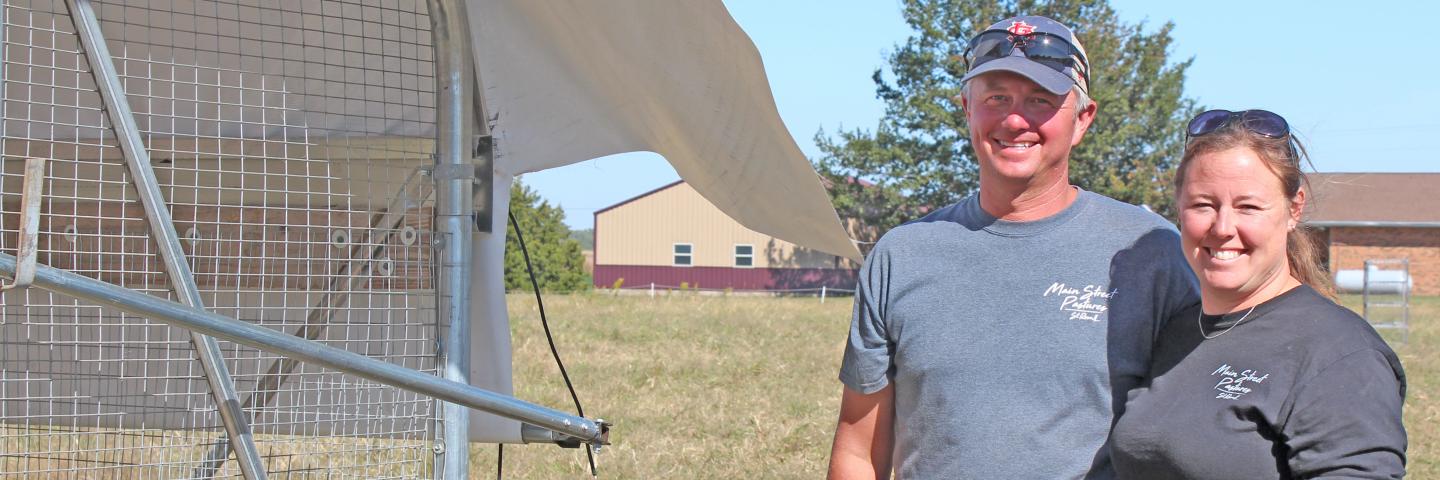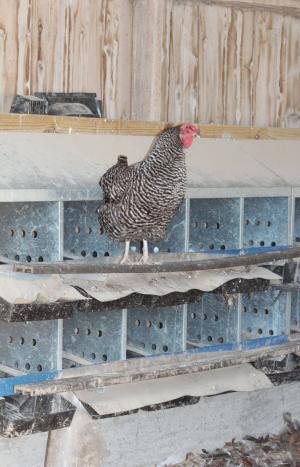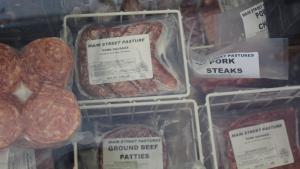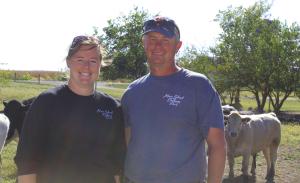
Meet Jill & Chad Vonder Haar from St. Rose, IL. Their operation is sustainable, profitable, and meets community needs.
JILL & CHAD VONDER HAAR
Main Street Pastures-St. Rose, IL
Overview
Jill Vonder Haar is always ready with a question. She’s never shied away from asking why – why farm that way and not this way? Why prioritize short term gains in productivity over soil health? This curiosity means that over their many years of shared experience on the farm, Jill and her husband Chad have constantly sought to improve their practices and land stewardship.

The Vonder Haars lived in town when they first got married and helped on the family farm when they could. But both Jill and Chad were on the lookout for a place of their own. Chad grew up on a dairy farm, and always planned to return to the land. They bought 80 acres from Chad’s family in 2010, growing conventional grain crops, but continued to search for a small farm where they could raise livestock. They finally purchased the land that would become Main Street Pastures in 2012.
They’ve grown slowly, starting out with sales of quarter beeves and halves of hogs to friends and neighbors. As demand for their products grew, they began selling packaged meat including steaks, brats, and ground beef. Chad’s a cattle man, and Jill and their four children have a fondness for smaller animals like chicken and pigs.
Jill and Chad farm roughly 140 total acres, they lease 25 acres and own the rest. Ten of those acres are in permanent pasture. Fifteen or so additional acres are in rotational pasture, where they alternate perennial pasture, non-GMO grains, and cover crops. They produce their own corn and soybeans for livestock feed and grow wheat, selling the grain and using the straw as livestock bedding.
Jill farms full-time and Chad pitches in on evenings and weekends, in addition to his full-time job off farm. Chad jokes that his work on the farm is, “the hardest part-time job I’ve ever had.” Farming is very much a family affair at Main Street Pastures. Jill and Chad have four children who are all involved in caring for the livestock. As they’ve gotten older, the kids have been able to take on more responsibility on the farm.
As their operation grows, Jill and Chad continue to seek out information about how to incorporate resiliency into their operation, attending conferences, field days, listening to podcasts. When Jill and Chad have been too busy to attend grazing events in the last several months, they’ve sent their eldest daughter.
Their grass-based farm raises some eyebrows in their community, where conventional dairy and grain operations predominate, but Jill says that engaging their neighbors’ curiosity is part of what they do.
Balancing Pandemic Supply and Demand
Each summer and early fall, Jill processes and stores enough inventory to last through May or June of the following year. Because of increased demand due to the COVID-19 pandemic, Jill had completely sold out of product by April, a full two months earlier than she’d expected. She says because poultry supply was so unreliable in the early months of the pandemic, many consumers turned to local, small-scale producers.

Demand for processing locally also spiked during the pandemic. For larger batchers of birds, Jill will typically make the two-hour drive to a USDA certified processor but during the pandemic there’s been limited availability. Fortunately, Jill has a license to process chickens herself and can manage about 50 birds at a time.
It’s been hard to know whether the increase in demand for local meat will continue beyond the initial shock of the pandemic. In 2019, Jill raised and processed 1,200 meat birds. She hoped to raise 2,000 birds in 2020 but suspects they may run out of product before next spring, even with an additional 60 pasture-raised turkeys. Jill also has 300 laying hens but could easily double the laying hen flock to increase egg supply.
They primarily sell direct-to-consumer through markets and their farm stand, but also sell to a small store, a few restaurants, and a food hub in St. Louis. Restaurant sales have declined during the pandemic but increased direct-to-consumer sales have more than made up for it.
Plan A (and B, C, and D)
Main Street Pastures is well-positioned to handle the kind of volatility that food systems have experienced in the last year. Jill remarks, “We always have a plan A but will be prepared for plan B, C, and D as the year goes on”. They’d eventually like to complete forego crop insurance, she says, instead relying on the diversity of their operation to provide financial stability.
Jill has experienced the benefit of moving away from a model that prioritizes yield. Their approach allows them to significantly reduce input costs. They’re hoping to reduce input costs even further by producing their own feed, “If we could be completely self-sufficient, it would be awesome.”
Holistic Management
Jill’s ethics are evident in the way she talks. She prioritizes transparency with customers and environmental stewardship. Birds, insects, and other wildlife are abundance on their land, a noticeable change from the early days of their operation. Jill says, “It’s amazing to go out in the pastures at night … the noise that you hear when you’re out there that you never heard when the field was in a crop.”
They’ve experimented with different ways to improve soil health and productivity. Jill describes one year when she ran chickens through their small orchard, and the resulting increase in insect diversity and reduction in pest pressure. They are also diligent about adding pollinator mixes to their pastures.

Main Street Pastures lacked infrastructure when the Vonder Haars purchased the property. Jill says that this blank slate allowed them to imagine creative ways to raise livestock and discouraged animal confinement. They’ve made investments in the property over time, including the recent purchase of a large “chicken schooner”, and on the short list for future investment are permanent fencing, watering infrastructure, and electricity in pastures.
With this in mind, the Vonder Haars signed-up with NRCS to have a Grazing Management Plan developed by a Technical Service Provider (TSP) through the Environmental Quality Incentives Program (EQIP). The Vonder Haars are currently working with the TSP identifying the resource concerns and conservation practices to address those concerns while obtaining their personal and farm goals. Once the Grazing Management Plan is complete, the Vonder Haar’s plan to apply for financial assistance through EQIP to install and implement the practices identified.
Jill’s advice to aspiring grass farmers is to ask lots of questions and reach out to people who are already farming. This question-based approach has proven successful for the Vonder Haars, who have grown their operation into a diverse, abundant farm that continues to nourish their family and their community.

